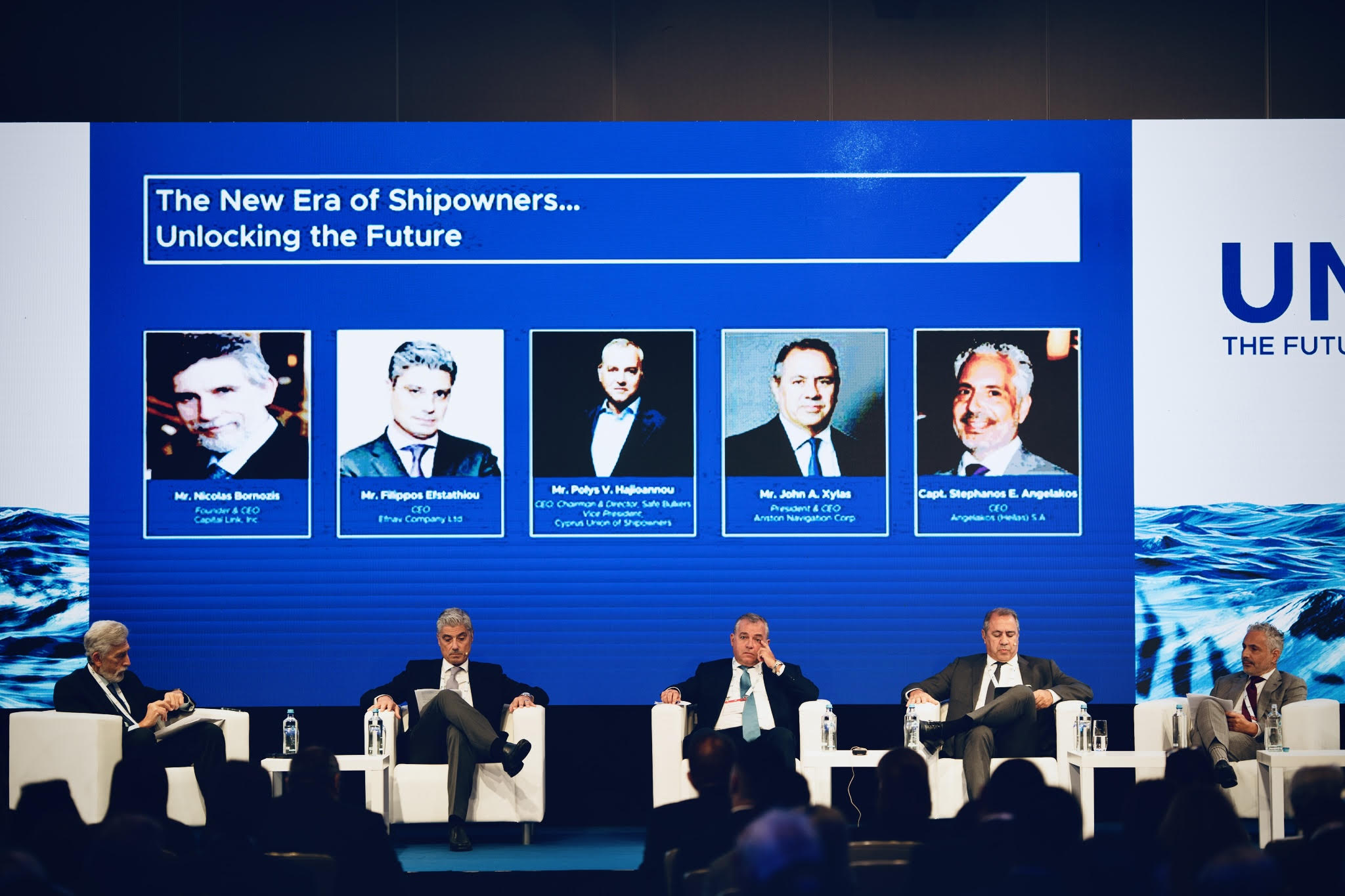The second day of the Maritime Cyprus 2025 Conference, held on Tuesday, brought together international industry leaders for discussions on insurance, ownership, and chartering trends under the theme “Unlocking the Future of Shipping.”
Throughout the day, speakers and delegates examined how cooperation, technology, and long-term thinking will shape the sector’s evolution amid continued regulatory, geopolitical, and economic pressures.
The day began with the panel “P&I Market: Latest Developments and Update about the Renewal Season 2026,” moderated by Filippo Fabbri, CEO at Lockton P.L. Ferrari, and featuring Paul Jennings, Managing Director at NorthStandard, Andrew Taylor, CEO at UK P&I Club, Jonathan Andrews, CEO at Steamship Mutual, and Rolf Thore Roppestad, CEO at Gard AS.
During the discussion, speakers focused on the resilience of the protection and indemnity market and the challenges shaping the 2026 renewal season.
According to the panel, greater transparency, data sharing, and the use of artificial intelligence are becoming increasingly vital to managing risk and strengthening the collective voice of the International Group.
Roppestad said global cooperation remains key, recalling that the introduction of the double-hull standard “was one of the most successful regulatory milestones in modern shipping.”
Since its adoption, he noted, oil spills from tankers have dropped by more than 95 per cent, clear proof that international collaboration delivers tangible results for both safety and the environment.
Jennings added that the industry must do more to communicate its achievements to policymakers and the public, stressing that regulators and shipowners should be “transparent together.”
Meanwhile, Taylor and Andrews pointed out that AI is already reshaping underwriting and claims management, though both agreed that human judgment and trust remain central to the concept of mutuality.
In addition, panelists discussed the growing impact of sanctions, nuclear verdicts, and fragmented regional regimes on insurance stability, calling for closer alignment across jurisdictions to safeguard the integrity of global trade.
Later in the day, attention turned to the session “The New Era of Shipowners… Unlocking the Future,” moderated by Nicolas Bornozis, Founder and CEO of Capital Link.
The panel brought together John A. Xylas, President and CEO at Ariston Navigation Corp., Polys V. Hajioannou, CEO, Chairman and Director at Safe Bulkers, Filippos Efstathiou, CEO at Efnav Company, and Capt. Stephanos E. Angelakos, CEO at Angelakos (Hellas) S.A.
Together, they explored how shipowners are navigating uncertainty around decarbonisation, regulation, and technology.
Xylas reaffirmed support for a single global regulatory framework under the IMO, describing it as essential for predictability and fairness. Hajioannou said that while shipowners are ready to adapt, “the cost of compliance inevitably passes through the supply chain,” calling for realistic timelines and balanced measures.
Efstathiou cautioned against “investing against a moving target,” arguing that acting prematurely on unproven technologies could backfire.
Moreover, Angelakos reminded that seafarers remain the backbone of the industry, urging continued investment in training, welfare, and retention.
As the session drew to a close, there was broad agreement that the Cyprus flag continues to stand as a benchmark for quality and competitiveness in global shipping.
The panelists particularly referred to the efficient 24/7 services offered by the Cyprus flag, as well as its high standards, proven track record, and strong international reputation.
Meanwhile, the final industry session of the day, “The Charterers’ Outlook: Navigating Markets, Risks, and Opportunities,” was moderated by Hajioannou and featured Joe Windscheffel, Director of Global Panamax Trading at Cargill Ocean Transportation, Benjamin Patchell, Global Head of Panamax Trading at Mercuria Energy Trading, and Mark Thompson, Senior Freight Trader at Olam Agri.
The discussion provided a charterer’s perspective on evolving commercial relationships, regulatory costs, and trade dynamics.
Speakers discussed the RightShip 10-year inspection policy, with Windscheffel saying that initial challenges have been outweighed by “enhanced safety and transparency.”
Patchell and Thompson agreed that vessel age matters less than responsible operation, stressing that older ships can remain competitive and safe when properly managed.
Turning to regulation, panelists examined the effects of the EU ETS and FuelEU Maritime, which have reshaped trade flows and vessel deployment.
Windscheffel explained that compliance costs are now priced into freight markets, while Patchell observed that more efficient vessels are naturally gravitating toward European routes.
Thompson warned that “regulations often disrupt operations more than they serve consumers,” pointing to the risk of rising protectionism and fragmented policy responses.
The session concluded with a discussion on closer cooperation between shipowners and charterers through initiatives such as the Dry Bulk Management Standard (DryBMS).
Hajioannou described the two sides as “two sides of the same coin,” emphasising that collaboration remains fundamental to a resilient maritime supply chain.
Finally, the day wrapped up with an afternoon session on “Embracing Innovation and Youth,” which featured presentations and demonstrations for young maritime professionals on METAVASEA, Drone Delivery, and IMarEST.
The European Maritime Safety Agency (EMSA) also delivered presentations on its services, as well as on the implementation milestones of FuelEU Maritime and the EU ETS.
Today, Wednesday, marks the third and final day of the Maritime Cyprus 2025 Conference, which will conclude with sessions focusing on climate resilience, regulatory adaptation, safety at sea, and the impact of technology on shipping and seafarers.
The event will close with reflections from international leaders and a forward-looking dialogue on how innovation, policy, and collaboration can continue to shape a sustainable future for global shipping.






Click here to change your cookie preferences